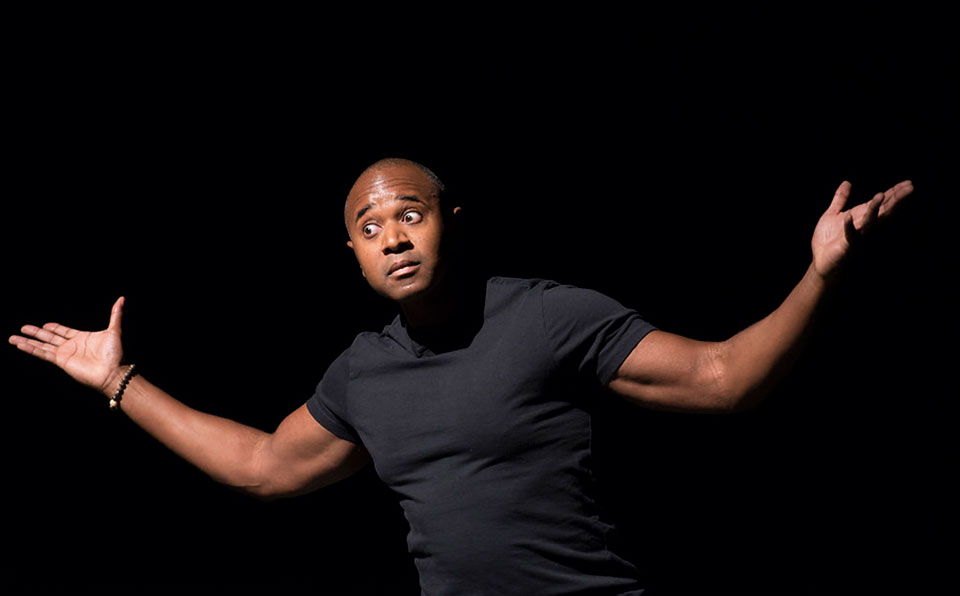
LOS ANGELES—Black!, written and performed by Michael Washington Brown, is not a solo show solely about the African-American experience per se. Instead, it is a broader look at people of African origin in England, Jamaica, the U.S.A. and sub-Saharan Africa. Brown incarnates men from these various locations (in fact, in the post-colonial segment of this 90-minute one-acter, he portrays both an interviewer and his interviewee), exploring what the playwright/actor calls in the L.A. premiere’s program the “distinct differences, yet, a very definite similarity between Black people from all walks of life” in disparate parts of our globalized planet.
In doing so Brown confronts stereotypes and varies his accent and demeanor as still and moving images (including of iconic Blacks like boxer/draft resister Muhammad Ali) projected on a screen behind Brown (technical design by Caitlin Rucker) punctuate his extended monologues. The gifted Brown seems to be a likely candidate for this dramatic exercise that’s often lightened by levity. Of Jamaican and Barbadian ancestry, Brown grew up in London, but since 1992 he has lived in California and New York. As such, the Black bard/thespian has what PAFF Executive Director Ayuko Babu might call a “Pan African” perspective (as Babu’s annual PAFF Film Festival of that name is dubbed).
Brown’s on-stage panoply of Blackness contributes to the notion of “Negritude” advanced, starting in the 1930s, by the American, Martiniquais and Senegalese poets Langston Hughes, Aimé Césaire and Léopold Senghor, who became independent Senegal’s first president. This anti-racist philosophy stressed decolonization—of the mind, as well as of foreign occupied territory. Intellectuals who advocated the concept of Negritude were influenced by socialism. In the faux Q&A Brown stages between himself and, well, himself toward the end of this production, Brown supports “education” as the means towards liberation.
Although the Pan African Film Festival does screen films from Down Under and Oceania, Melanesians—Black Pacific Islanders from Fiji, Papua New Guinea, etc.—and Australian Aborigines are not depicted in Brown’s sprawling look at the wide world of Blackness. Perhaps this is so because he does not consider these Black people so far from Mother Africa to be of African origin and to be part of the Diaspora.
En route during Brown’s yeoman-like marathon, some theatergoers may discern and detect what they consider to be Brown’s perpetrating and perpetuating of some stereotypes of his own. For example, the notion that one must never touch a Black woman’s hair, as if this is a universal given. Nevertheless, Brown envisions and enacts an enjoyable, thought-provoking theatrical examination of and excursion into what it means to be Black in the world today. Black! makes an important contribution to the dialogue through the medium of the stage at a time when racism remains a vital issue from the White House to the football field to the ballot box and beyond
The opening night audience, which was largely African American, seemed to greatly enjoy and appreciate the show, as did white ticket buyers. Black! may have an anti-racist tilt but it is not in the “up-against-the-wall-motherf**ker, in-your-face-whitey!” mold that may have some non-Black theater-lovers feeling threatened and reluctant to go. But this is not an uncomfortable “Black attack” – in fact, it’s quite entertaining, as well as enlightening. Along with Rogue Machine’s American Saga Gunshot Medley: Part 1, which opened the same weekend at The Met, Black! makes a valuable addition to our social discourse through theatre at a time when we—I mean people of all ethnicities—really need it.
Black! is performed Sundays at 7:00 pm through October 14 at The Zephyr Theatre, 7456 Melrose Ave., Los Angeles 90046. Info: (800) 838-3006 or here. The actor’s website can be accessed here.












Comments